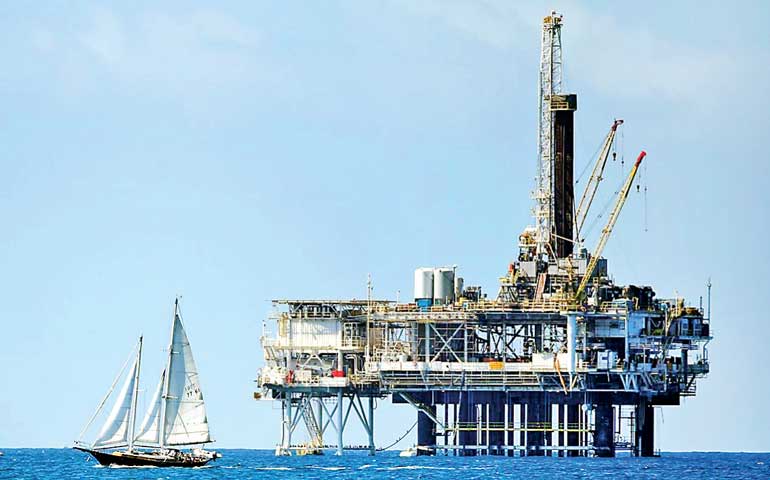Friday Feb 20, 2026
Friday Feb 20, 2026
Wednesday, 17 January 2018 00:00 - - {{hitsCtrl.values.hits}}
 SINGAPORE (Reuters): Brent crude oil prices held near $70 a barrel on Tuesday, a level not seen since 2014’s dramatic market slump.
SINGAPORE (Reuters): Brent crude oil prices held near $70 a barrel on Tuesday, a level not seen since 2014’s dramatic market slump.
Prices have been driven up by production curbs in OPEC nations and Russia, as well by strong demand thanks to healthy economic growth.
Brent crude futures dipped 30 cents, or 0.4%, to $69.96 per barrel by 0748 GMT on Tuesday from the previous day’s close. But traders said Brent was well supported overall around $70 a barrel.
Brent hit $70.37 a barrel on Monday, a December 2014 high, when markets were at the beginning of a three year-long slump.
US West Texas Intermediate (WTI) crude futures were at $64.47 a barrel, up 17 cents, or 0.3% from their last settlement. WTI hit a December-2014 peak of $64.89 a barrel in early trading.
Oil has been pushed higher by an effort led by the Organization of the Petroleum Exporting Countries (OPEC) and Russia to withhold production since January last year. The cuts are set to last through 2018.
The restraint has coincided with healthy oil demand, pushing up crude by almost 15% since early December.
“This rally has been driven first by robust fundamentals, with strong demand growth and high OPEC compliance accelerating,” US bank Goldman Sachs said in a note on Tuesday.
“We see increasing upside risks to our $62 per barrel Brent and $57.5 per barrel WTI forecast for the coming months,” it added.
Other US banks, including Bank of America Merrill Lynch and Morgan Stanley, have already upped their price forecasts.
“We have updated our supply/demand balances to reflect a faster-than-expected tightening in the global oil market due to improving cyclical conditions, cold winter weather, and higher than expected OPEC compliance,” Bank of America Merrill Lynch said.
“We now see a deficit of 430,000 barrels per day (bpd) in 2018 compared to 100,000 bpd prior, and thus see Brent crude oil prices averaging $64 per barrel in 2018 compared to $56 prior. Our WTI projection also moves up from $52 per barrel to $60 per barrel for the same reasons,” the bank said.
Morgan Stanley said “oil markets were 0.5 million bpd undersupplied in 2017,” adding that 2018 would still see a 200,000 bpd deficit.
It expected Brent to rise to around $75 per barrel by the third quarter of this year.
A major factor holding back crude prices in 2017, the surge in US production, has stalled at least temporarily as icy winter weather in North America has shut down some facilities.
Instead of hitting 10 million bpd this month, as widely expected, US production fell from 9.8 million bpd in December to 9.5 million bpd currently.
However, most analysts still expect US production to break through 10 million bpd soon.